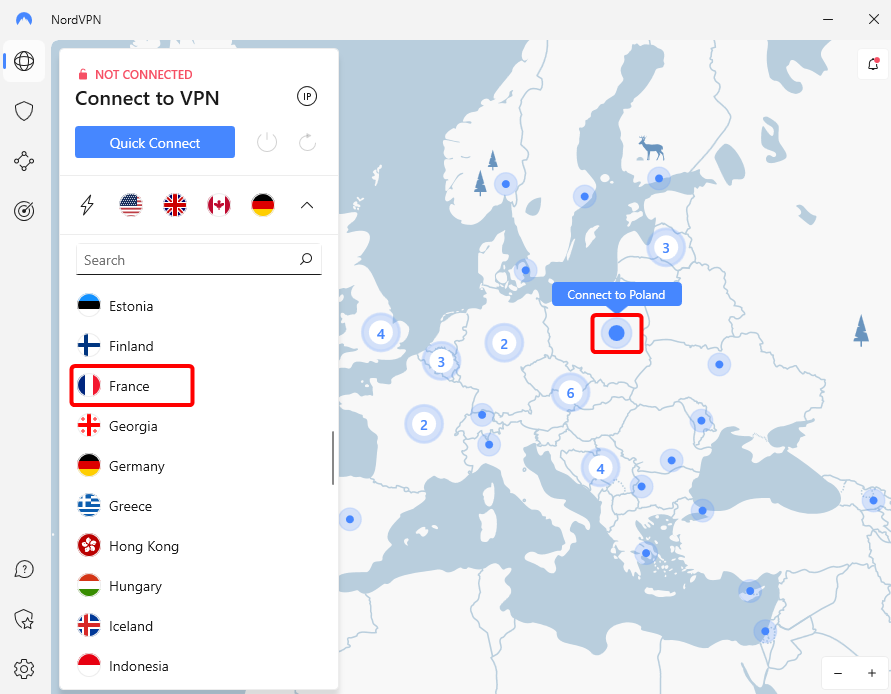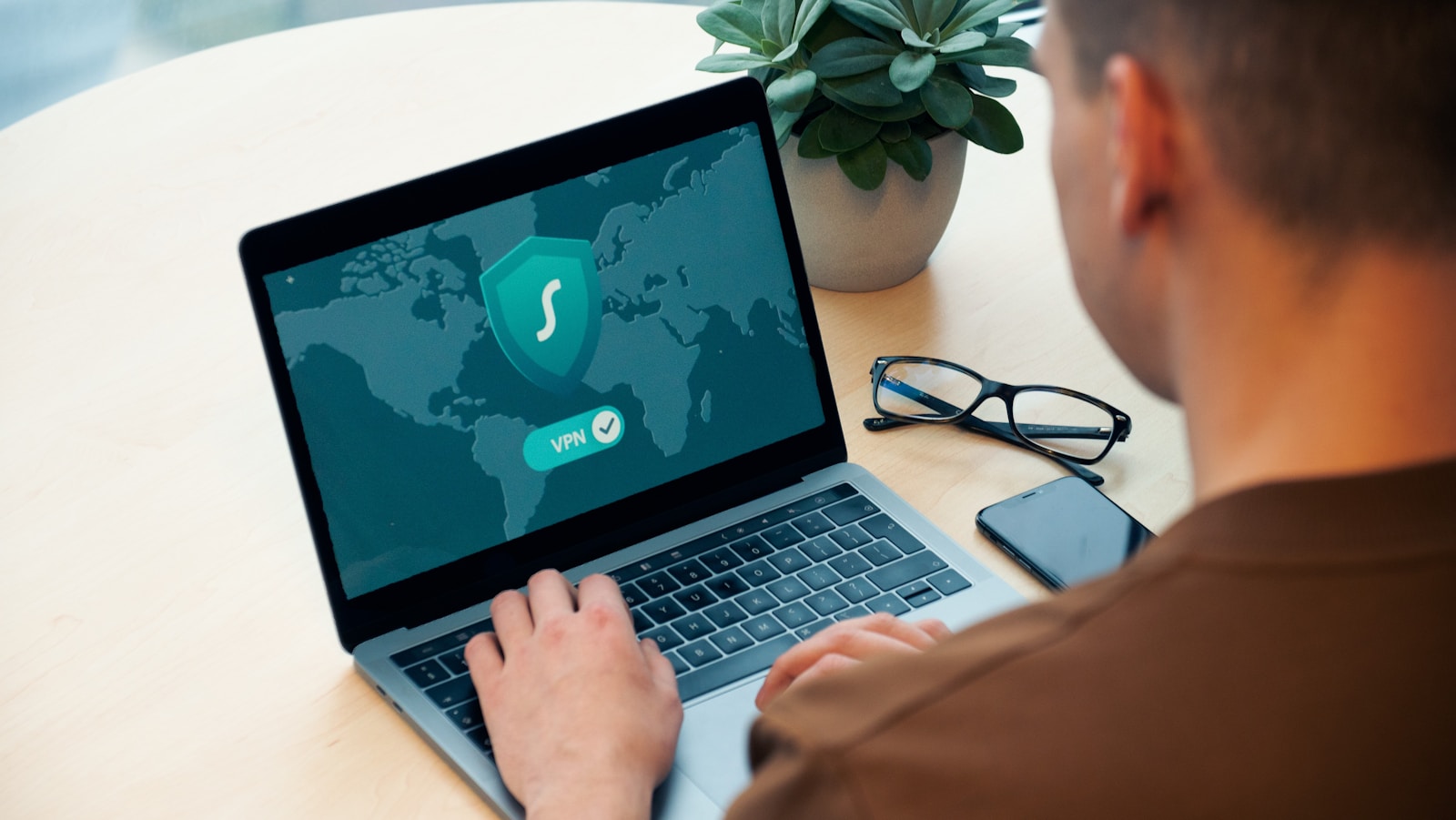Finding the best privacy VPN can be a key step in safeguarding a user’s online activities. VPNs are an essential tool for many who wish to maintain privacy and security while browsing the internet. Choosing the right VPN involves understanding aspects such as encryption strength, no-logging policies, and overall reliability.
VPNs are often valued for their ability to mask IP addresses, providing an extra layer of anonymity. Many users look for services that promise high speed and a seamless user experience to ensure daily tasks are not disrupted. Whether for personal or professional use, selecting a quality VPN is crucial for a safe and private online journey.
1) NordVPN

NordVPN is a popular choice for people looking for strong online privacy. It boasts a strict no-logs policy, meaning it does not collect or store users’ online activities. The company’s commitment to privacy is further enhanced by its location in Panama, which has favorable privacy laws.
Security features include military-grade encryption, which helps keep data safe from prying eyes. NordVPN also offers features like a kill switch and double VPN for an extra layer of protection. These features ensure that users’ data remains secure, even if the VPN connection drops.
NordVPN is known for its fast speeds, making it ideal for streaming and downloading large files. The service supports various platforms like Windows, Mac, Android, and iOS, providing flexibility for users on different devices.
NordVPN is also praised for its ability to access content on popular streaming services, such as Netflix and Amazon Prime Video. This makes it a great option for those who want to watch shows and movies from different regions.
2) ExpressVPN
ExpressVPN is often recognized for its robust privacy features. It offers a strict no-logs policy, which means it does not record your online activities. This approach has been confirmed through independent audits, ensuring user trust.
Speed and reliability are standout features of ExpressVPN. It provides fast connection speeds, making it suitable for streaming and downloading. The VPN operates a vast number of servers worldwide, allowing users to connect easily from many locations.
ExpressVPN’s apps are user-friendly and compatible with various devices. This makes it accessible for people new to VPNs and those who are more experienced. Additionally, it utilizes strong encryption to secure data, enhancing online privacy.
While ExpressVPN has many strengths, it is worth noting that it may come with extra costs for additional features. Still, its commitment to privacy and service quality makes it a leading choice for those seeking a reliable VPN service.
3) ProtonVPN
ProtonVPN is a popular choice for those who value privacy and security. It offers a user-friendly interface, making it accessible for both beginners and experienced users. Its open-source framework allows users to verify its security claims independently.
One of ProtonVPN’s standout features is its no-logs policy. This means that it does not keep records of users’ online activities, adding an extra layer of privacy. This is especially important for those concerned about data protection.
ProtonVPN also offers a strong free version, which makes it appealing for users who want to try it without financial commitment. The free plan includes access to servers in three countries and does not limit bandwidth.
The premium version of ProtonVPN enhances the experience with access to servers in more locations and additional features like optimized streaming servers. This makes it a great option for people who need faster speeds or access to content in different regions.
It provides robust encryption, ensuring that users’ data remains secure while they browse the web. Additionally, ProtonVPN’s high-performance server network helps maintain quick connection speeds. This makes it a reliable option even for demanding internet activities.
4) Mullvad
Mullvad is a standout choice when privacy is a key concern. It has a long-standing reputation for protecting user data. They focus on keeping users anonymous and secure online.
Users don’t need to provide any personal information to create an account. Mullvad uses a unique account number. This approach helps maintain user privacy.
The VPN supports advanced security features. One such feature is IPv6 native connections, which are increasingly important in a digital world. Mullvad also offers strong encryption protocols.
Speed is another strength of Mullvad. They frequently receive praise for their fast connection speeds. This makes the service a good choice for users who don’t want to compromise speed for privacy.
Additionally, Mullvad is competitively priced. They offer affordable pricing without skimping on quality or features. This makes it accessible to budget-conscious consumers looking for a reliable privacy-first VPN.
5) TorGuard
TorGuard is a popular choice for those looking to secure their online privacy and anonymity. It offers a wide network of servers, giving users the ability to browse safely in over 50 countries. This makes it easy for users to find a server location that meets their needs.
The service is especially appealing to those who engage in torrenting due to its high-speed connections. The VPN provides advanced features, ensuring that data remains protected from prying eyes. It supports the latest VPN protocols, which adds an extra layer of security.
TorGuard is also well-regarded for its no-logs policy, ensuring that users’ online activities are not stored. This is crucial for anyone focused on maintaining privacy. The VPN offers various pricing plans, catering to both casual users and those who need additional options.
6) AirVPN
AirVPN is known for its strong privacy and security features. It uses OpenVPN and WireGuard protocols to keep user data protected. These protocols are reliable and widely trusted in the VPN community.
The service was created by privacy activists. They focus on upholding net neutrality and fighting against online censorship. This makes AirVPN a good choice for users who prioritize privacy.
Users report varied Internet speeds with AirVPN. Some experience around 50% to 75% of their normal speeds when connected. The speed can depend on which servers are used and their proximity to the user.
AirVPN offers a clear no-logs policy, meaning they don’t track what users do online. This is important for those who value their online privacy.
The service also allows users to bypass censorship from ISPs. It’s effective in places with strict internet regulations, providing users with open and unrestricted internet access.
7) Surfshark
Surfshark offers users a reliable VPN solution with a focus on privacy and security. It includes features such as military-grade encryption and a no-logs policy, ensuring user data remains private. Surfshark is designed to provide strong protection for everyday use.
One notable feature of Surfshark is the ability to connect an unlimited number of devices on a single account. This can be especially useful for families or individuals with multiple gadgets. Additionally, Surfshark includes tools like a Kill Switch and an Ad Blocker, enhancing online safety.
Surfshark’s affordability makes it an attractive choice for many. While it offers competitive pricing, it has been noted that it may not be the cheapest option available. For those with general privacy needs, Surfshark is a strong contender.
The VPN service has received positive feedback for its speed and versatility. Users have appreciated its broad range of features that aim to improve both security and convenience in web browsing. This balance of speed and security makes it a versatile option for users seeking dependable online privacy.
8) CyberGhost
CyberGhost is a popular VPN choice for users seeking privacy and security online. It offers strong encryption, keeping user data safe from prying eyes. The VPN enforces a strict no-logs policy, ensuring that online activities remain private.
CyberGhost is compatible with various devices, including Windows, iOS, Mac, Android, and Linux. This makes it a flexible option for families or individuals using multiple platforms. Users also appreciate its fast server speeds that help in streaming and downloading content smoothly.
The service undergoes third-party audits to confirm its privacy claims. These audits add a layer of trust for users concerned about data security. CyberGhost is known for its user-friendly interface, making it accessible even for those new to VPN services.
For those on a budget, CyberGhost provides a strong balance between cost and features. It ranks well among VPNs for affordability while still delivering reliable performance. Despite its affordability, it doesn’t skimp on key features like encryption and server options.
9) IPVanish
IPVanish is a well-known VPN service trusted by many for its strong privacy features. It encrypts internet traffic and hides a user’s IP address, increasing online privacy and security. This makes it a solid choice for those concerned about their digital footprint.
One of the key benefits of IPVanish is its ability to support multiple devices simultaneously. This is helpful for families or individuals with several gadgets. Its extensive network of servers around the world allows users to access content from different regions easily.
IPVanish also provides important features like DNS leak protection and a kill switch. These tools help ensure that user data stays private, even if the VPN connection drops. Additionally, IPVanish is recognized for its user-friendly interface and is easy for beginners to set up and use.
Another appeal is the service’s strong unblocking capabilities, making it a good choice for streaming enthusiasts. Whether accessing region-locked shows or platforms, IPVanish often succeeds in bypassing restrictions smoothly.
The emphasis on privacy means IPVanish doesn’t keep logs of user activity, which is an important feature for privacy-focused individuals. This means there’s an added layer of confidence for users who prioritize keeping their browsing habits private.
10) Hotspot Shield
Hotspot Shield ranks highly as a popular VPN service known for its speed and security features. It uses the Hydra protocol, which enhances its speed, making it suitable for streaming and gaming.
Another key feature is the AES-256 encryption, providing strong security for online activities. This ensures that users’ data remains confidential while browsing.
The VPN is available on multiple platforms, including Windows, Mac, Android, and iOS. This versatility makes it accessible for many users.
There are mixed opinions about its free version’s security. Some users suggest that it might not adequately mask IP addresses, raising privacy concerns. Users should consider this when deciding on the free version.
For those looking for a paid option, Hotspot Shield offers premium features that may appeal to those seeking faster speeds and more robust protection.
Understanding VPN and Privacy
Virtual Private Networks (VPNs) are essential tools for individuals seeking online privacy. They create secure connections while encrypting data to protect users from spying eyes. There are misconceptions about VPNs that need clarification.
What Is a VPN?
A VPN, or Virtual Private Network, is a service that creates a secure connection between a user’s device and the internet. This secure tunnel routes the user’s internet traffic through an encrypted connection to a server operated by the VPN provider. This setup masks the user’s IP address and location, providing privacy and security.
People use VPNs for different reasons including accessing content restricted in their region and protecting sensitive data on public Wi-Fi. It adds an extra layer of security often necessary when conducting transactions online or connecting to public networks. Utilizing a reliable VPN service ensures that user data is shielded from potential threats.
How VPNs Protect Your Privacy
VPNs protect privacy by encrypting internet traffic. This encryption makes it difficult for third parties, such as hackers and internet service providers, to monitor or access users’ data. When a user connects to a VPN, data is sent through a secure tunnel, which maintains anonymity.
VPNs also allow users to browse with an IP address from a different location, safeguarding their true digital identity. This feature is crucial for accessing services that may be blocked in certain regions. Additionally, many VPNs come with anti-tracking functions, preventing websites from following users’ online activities.
Common Misconceptions About VPNs
Though VPNs offer privacy benefits, they are not foolproof. A common misconception is that VPNs make users completely anonymous online. While browsing data is hidden from ISPs, websites might still track users through cookies or browser fingerprinting.
Another misconception is that all VPNs are secure. Some free or unreliable VPNs may log user data or sell it to advertisers. It is vital to choose a reputable VPN provider. Users should look for VPNs with no-log policies and strong encryption standards to ensure true privacy. Understanding these facts helps individuals choose VPNs that best suit their privacy needs.
Privacy Features to Look For
When choosing a VPN for privacy, it is essential to focus on features like robust encryption standards, strict no-log policies, and reliable kill switch functionality. These components ensure that your online activities remain private and protected from unwanted surveillance.
Encryption Standards
A key privacy feature in any VPN is encryption. Strong encryption ensures that data transmitted between your device and the VPN server remains private. AES-256 is widely regarded as the gold standard. This level of encryption is practically unbreakable, even for governments or large organizations.
Some VPNs also use advanced protocols like WireGuard, which are known for speed and security. These protocols help maintain a secure connection while minimizing any slowdown in internet speed.
No-Log Policies
A no-log policy means the VPN provider does not keep records of your online activity. This is critical for maintaining privacy. It ensures that even if someone accesses the VPN servers, they won’t find logs of your browsing history, IP addresses, or personal data.
Look for VPNs that have been audited by third parties to verify their no-log claims. Trustworthy providers are transparent about their logging practices and provide detailed privacy policies for users to review.
Kill Switch Functionality
A kill switch is an important VPN feature that protects privacy. If the VPN connection suddenly drops, a kill switch will disconnect your device from the internet. This prevents data leaks when the VPN is not active.
Some VPNs allow users to customize the kill switch settings. This allows for disabling internet access for specific apps or the entire system, ensuring maximum privacy. Reliable kill switch functionality is crucial for uninterrupted protection.
Legal and Jurisdictional Considerations
When choosing a VPN, legal jurisdiction and data retention laws are crucial aspects. The location of a VPN provider can greatly affect user privacy and security, especially in terms of how personal data is handled.
Understanding Jurisdiction Impact
A VPN’s jurisdiction refers to the country where the VPN service is based. This matters because each country has its own set of privacy laws. For instance, some countries may require companies to store user data or comply with government requests for data access.
Countries like Panama, the British Virgin Islands, and Switzerland are known for favorable privacy laws. These locations typically do not require VPNs to retain data or comply with strict surveillance laws. This provides an additional layer of protection for users, making these jurisdictions attractive for VPN services aimed at preserving user privacy.
Data Retention Laws
Data retention laws determine how long a VPN provider must keep user data. In some countries, laws mandate storing user information for a certain period, which could be risky for privacy.
For users seeking maximum privacy, it is beneficial to choose a VPN based in countries without mandatory data retention policies. Countries such as Iceland and Panama often do not require VPNs to keep any user data, enhancing privacy.
Understanding these laws helps users make informed choices about which VPN services offer the most secure environments for their needs. Each country’s legal setting directly impacts what user data is stored and for how long, significantly affecting overall privacy.
Frequently Asked Questions
When selecting a VPN, it’s crucial to understand what makes one service more secure than another. Not all VPNs offer zero-logging policies, and paid VPNs often provide more security features than free ones. The following questions address common concerns about choosing a high-privacy VPN.
What criteria define the most secure VPN?
The most secure VPNs typically use strong encryption protocols like OpenVPN or WireGuard. These services often offer features such as a kill switch, DNS leak protection, and multi-factor authentication. They should also have a strict no-logs policy, ensuring that user data is not stored or shared.
Are there any VPN providers that guarantee zero-logging of user data?
Yes, some VPN providers, such as NordVPN and ProtonVPN, guarantee zero-logging of user data. These services adhere to strict privacy standards and often undergo third-party audits to verify their claims. A zero-logging policy means that no information about the user’s online activities is stored.
How does a VPN ensure my online activities remain private?
A VPN keeps online activities private by encrypting internet traffic and routing it through servers located around the world. This process hides the user’s IP address and makes it difficult for anyone to track their online behavior. Features like obfuscation technology further enhance privacy by disguising VPN traffic.
What are the key features to look for in a high-privacy VPN service?
A high-privacy VPN service should have strong encryption standards, a no-logs policy, and a wide range of server locations. Additional features like a kill switch, split tunneling, and support for multiple devices are also important. Choosing a VPN that regularly updates its software ensures better security against new threats.
Can a free VPN provide the same level of privacy as a paid VPN?
Free VPNs often lack the robust security features found in paid ones. They may have limited bandwidth, fewer server locations, and less reliable privacy policies. Paid VPNs like ExpressVPN and TorGuard usually provide stronger encryption, better speed, and comprehensive customer support, making them more suitable for privacy-focused users.
What methods do top VPNs use to prevent tracking and detection?
Top VPNs use advanced techniques such as server obfuscation, DNS leak protection, and multiple encryption protocols to avoid tracking and detection. These measures help maintain user privacy and keep online activities hidden. Providers like Mullvad and ProtonVPN are known for their effectiveness in preventing VPN blocking and tracking.







